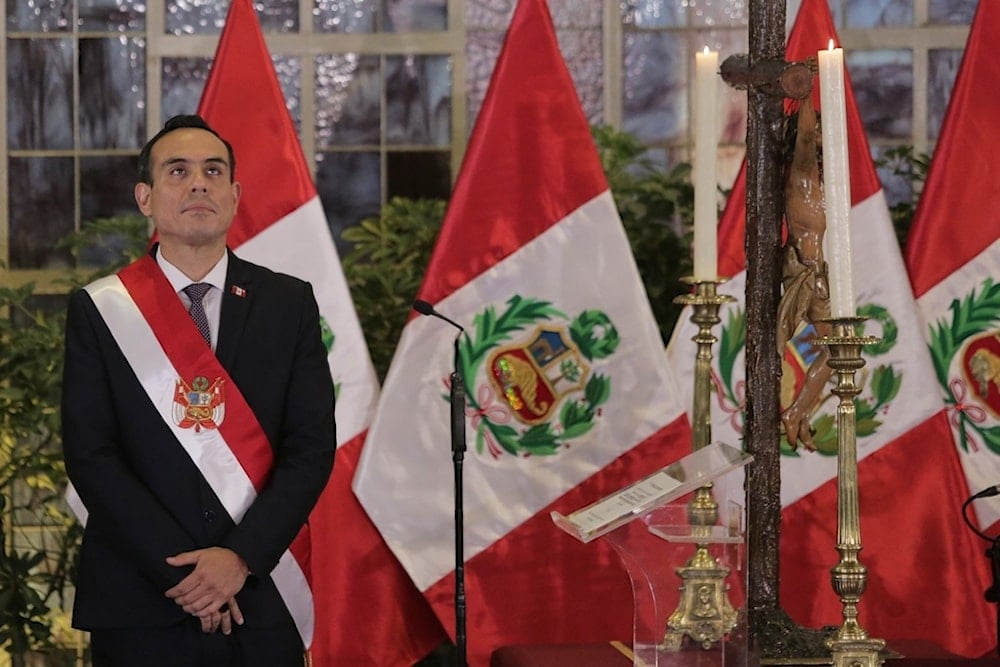Peru's interim president swears in hard-right cabinet
Peru's interim president José Jerí has formed a conservative, security-focused cabinet led by Ernesto Álvarez following Dina Boluarte's ouster.
-

Peru's President Jose Jeri attends the swearing-in ceremony of his new cabinet at the government palace in Lima, Peru, Tuesday, Oct. 14, 2025. (AP)
Peru's interim president, José Jerí, has sworn in a new cabinet led by former Constitutional Court magistrate Ernesto Álvarez, just four days after the ouster of Dina Boluarte, after which Jerí assumed office. The reshuffle comes as Jerí seeks to restore authority and stability in a country reeling from surging crime, corruption scandals, and nearly a decade of political turmoil.
Rapid, uncertain transition
The sudden power shift followed Boluarte's impeachment by Congress on charges of "permanent moral incapacity," a constitutional mechanism that lawmakers have used repeatedly in recent years. Her removal came after weeks of public outrage over a luxury jewelry scandal and the government's failure to contain rampant extortion and homicides. A deadly concert shooting in Lima further fueled the perception that state institutions had lost control.
With no vice presidents to succeed Boluarte, Jerí, who had been serving as president of Congress, was constitutionally next in line. His swift appointment marked the eighth presidency in less than ten years, reflecting Peru's chronic political instability.
Read more: Dina Boluarte ousted by unanimous vote in Peru’s congress
Rise of José Jerí
At 38, José Enrique Jerí Oré is one of Peru's youngest leaders in modern history. A lawyer and member of the centrist-right Somos Perú party, he entered Congress in 2021 and rose to prominence as a skilled negotiator among fragmented parliamentary blocs. However, his record is not without controversy: he has faced past allegations of misconduct and has been accused of maintaining close ties to entrenched political elites.
Observers say Jerí's limited executive experience and dependence on conservative factions in Congress have shaped his decision to appoint a security-heavy, right-leaning cabinet.
Cabinet of control
The new prime minister, Ernesto Álvarez, is a staunch conservative and member of the Popular Christian Party. He has drawn criticism for labeling recent youth-led protests as subversive acts linked to the Túpac Amaru Revolutionary Movement (MRTA). "Heir to the Túpac Amaru Revolutionary Movement (MRTA), the gang that wants to take democracy by storm to control the April elections (2026) does not represent the youth who study and work for a future," Álvarez wrote on social media last month.
After Boluarte's removal, Álvarez warned that "Jerí appoints a caviar cabinet with people from NGOs and Vizcarra, or he is overthrown by violent marches to place a Sagasti 2.0," adding that the demonstrations called for October 15 were "a subversive attempt to end democracy and force a ‘Bolivarian' constituent assembly."
Despite this rhetoric, Jerí presented the new government as one of "broad-based and national reconciliation," though the appointments point to a consolidation of conservative influence.
Security at the forefront
Vicente Tiburcio Orbezo, a retired police general who helped capture Shining Path leader Abimael Guzmán in 1992, was appointed Minister of the Interior. "Yes, I swear," Tiburcio declared during the ceremony, pledging to make citizen security his top priority.
Other appointments include Hugo de Zela Martínez as Foreign Minister, César Francisco Díaz Peche as Defense Minister, and Denisse Azucena Miralles as Minister of Economy and Finance. Walter Eleodoro Martínez Laura, a lawyer and former justice official, was named Minister of Justice and Human Rights.
The rest of the cabinet features Jorge Eduardo Figueroa Guzmán (Education), Luis Napoleón Quiroz Avilés (Health), Vladimir Germán Cuno Salcedo (Agriculture), Teresa Stella Mera Gómez (Trade and Tourism), Luis Enrique Bravo de la Cruz (Energy and Mines), Aldo Martín Prieto Barrera (Transport), Wilder Alejandro Sifuentes Quilcate (Housing), Sandra Liz Gutiérrez Cuba (Women and Vulnerable Populations), Miguel Ángel Espichán Mariñas (Environment), Óscar Fausto Fernández Cáceres (Labor), Alfredo Martín Luna Briceño (Culture), and Lesly Nadir Shica Seguil (Social Inclusion).
Economic continuity, social risk
Jerí's administration has pledged to prioritize economic stability, with Miralles, a pro-market technocrat, tasked with maintaining investor confidence. The government aims to reassure businesses and international partners that Peru will remain fiscally disciplined and open to investment.
However, the strong security focus and conservative tilt have raised fears of renewed protests and potential human rights violations. Critics warn that the administration's approach may deepen social divisions, especially if anti-government demonstrations are met with repression.
Read more: Ecuador Noboa's motorcade comes under rock-throwing attack, 5 detained

 4 Min Read
4 Min Read










